Results for: Kuzma

Faculty Spotlight: Khara Grieger
Patti Mulligan, July 15, 2019 | INTERVIEW: We sat down with the GES Center’s newest Senior Research Scholar, Khara Grieger. She joined our team in the spring of 2019, but has already given a colloquium and is working on several nanotechnology-related research projects.
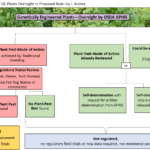
Biotechnology Oversight Gets an Early Make-Over by Trump’s White House and USDA: Part 2 – The USDA-APHIS Rule
Jennifer Kuzma, July 2, 2019 | USDA-APHIS has proposed an oversight process for GE crops that appears to be a significant departure from the current one. This article discusses the features of the proposed new rule, along with its strengths and weaknesses and my recommendations for how it should be amended.
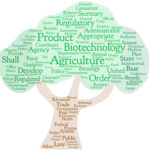
Biotechnology Oversight Gets an Early Make-Over by Trump’s White House and USDA: Part 1—The Executive Order
Jennifer Kuzma, June 18, 2019 | Last week, the Trump administration set the tone for its oversight of agricultural biotechnology (ag biotech) through two major actions: 1) Signing the Modernizing the Regulatory Framework for Agricultural Biotechnology Products Executive Order; and 2) Proposing a draft rule on the Movement of Certain Genetically Engineered Organisms (GEOs), changing how USDA reviews GE plants.
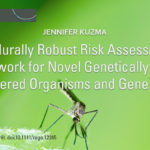
Procedurally Robust Risk Assessment Framework for Novel Genetically Engineered Organisms and Gene Drives
Jennifer Kuzma, March 8, 2019 | This article reviews the current state of gene-editing regulation for crops, illuminating the ways in which technology developers are repeating practices that may lead to the public and ethical failures of the first generation genetically engineered crops, and argues that the contentious socio-political history of genetic engineering will repeat itself for gene editing if these continue.
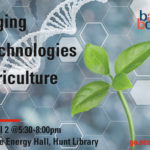
Emerging Biotechnologies in Agriculture
Emerging Biotechnologies in Agriculture | April 2, 2019, 5:30PM, Duke Energy Hall, Hunt Library – $10-$35 | Join the GES Center, industry and government experts, and the Triangle BABCNC as we discuss genetic approaches to agricultural pest management and crop science and explore the myths and realities of the GMO debate in the US and Europe.
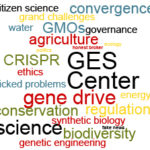
Give
The Genetic Engineering and Society (GES) Center at NC State University serves as an international hub of interdisciplinary research, engaged scholarship, and inclusive dialogues surrounding these opportunities and challenges. Positioned at the nexus of science…
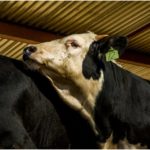
WP: Gene-edited farm animals are coming. Will we eat them?
“We’re at this inflection point in society, where gene editing is really taking off, and now is the time we could have a more sustained public conversation about how we want it used in our world and how we don’t want it to be used,” said Jennifer Kuzma, co-director of the Genetic Engineering and Society Center at North Carolina State University. “All the polls indicate that people are less comfortable with animal biotechnology than plant biotechnology… A regulatory system cannot be based 100 percent on science or scientific risk, and values come into play when setting the standards.”
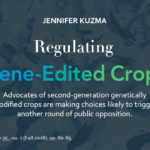
Issues: Regulating Gene-Edited Crops
This article reviews the current state of gene-editing regulation for crops, illuminating the ways in which technology developers are repeating practices that may lead to the public and ethical failures of the first generation genetically engineered crops, and argues that the contentious socio-political history of genetic engineering will repeat itself for gene editing if these continue.

4 NC State Faculty Named AAAS Fellows
The American Association for the Advancement of Science elects 416 fellows, including four from NC State. Meet our newest members of the prestigious organization.
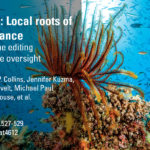
Editing nature: Local roots of global governance
Dr. Jennifer Kuzma, Goodnight-NC GSK Foundation Distinguished Professor and Co-director of the Genetic Engineering and Society Center, was one of the lead authors on an interdisciplinary team calling for global oversight of environmental gene editing in this Science Policy Forum, Editing Nature: Local roots of global governance.
ISSP-RCIScience Lecture Series: Intersection of Science, Society and Policy
GES Co-Director, Jennifer Kuzma, to speak on panel at ISSP-RCIScience Lecture Series:The Institute for Science, Society and Policy and the Royal Canadian Institute for Science is pleased to invite you to the first public panel…
Continue reading “ISSP-RCIScience Lecture Series: Intersection of Science, Society and Policy”
Biotech Communication Workshop
The GES Center is partnering with the United States Department of Agriculture (USDA), the China Ministry of Agriculture, and the US Trade and Development Agency to organize a workshop on “Communication, Engagement, and Biotechnology.” Several…
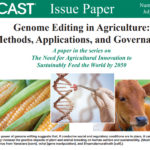
Genome Editing in Agriculture – CAST Issue Paper
PRESS RELEASE: July 9, 2018. Twentieth-century advances in plant and animal breeding did much to help meet the increasing food, fiber, feed, and fuel needs of an expanding world. But continued population growth, resource shortages, climate change, and pest prevalence make sustainability a daunting yet essential task. Genome editing is a powerful new method that enables unprecedented control over genetic material and offers the opportunity to make rapid advances that influence agricultural practices.

Pesticide Resistance Arms Race
In this episode we talk with Fred Gould, William Neal Reynolds Professor of Agriculture and Life Sciences, about the rising rates of herbicide and pesticide resistance, the current state of the resistance arms race and what we need to do in the future to protect our crops and human health from resistant pests. Length: 15 minutes
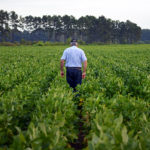
What Happens If We Run Out? Pesticide Resistance Needs Attention, Large-Scale Study
How can we slow pest resistance to herbicides and pesticides? NC State researchers say large-scale studies are needed to test new strategies.